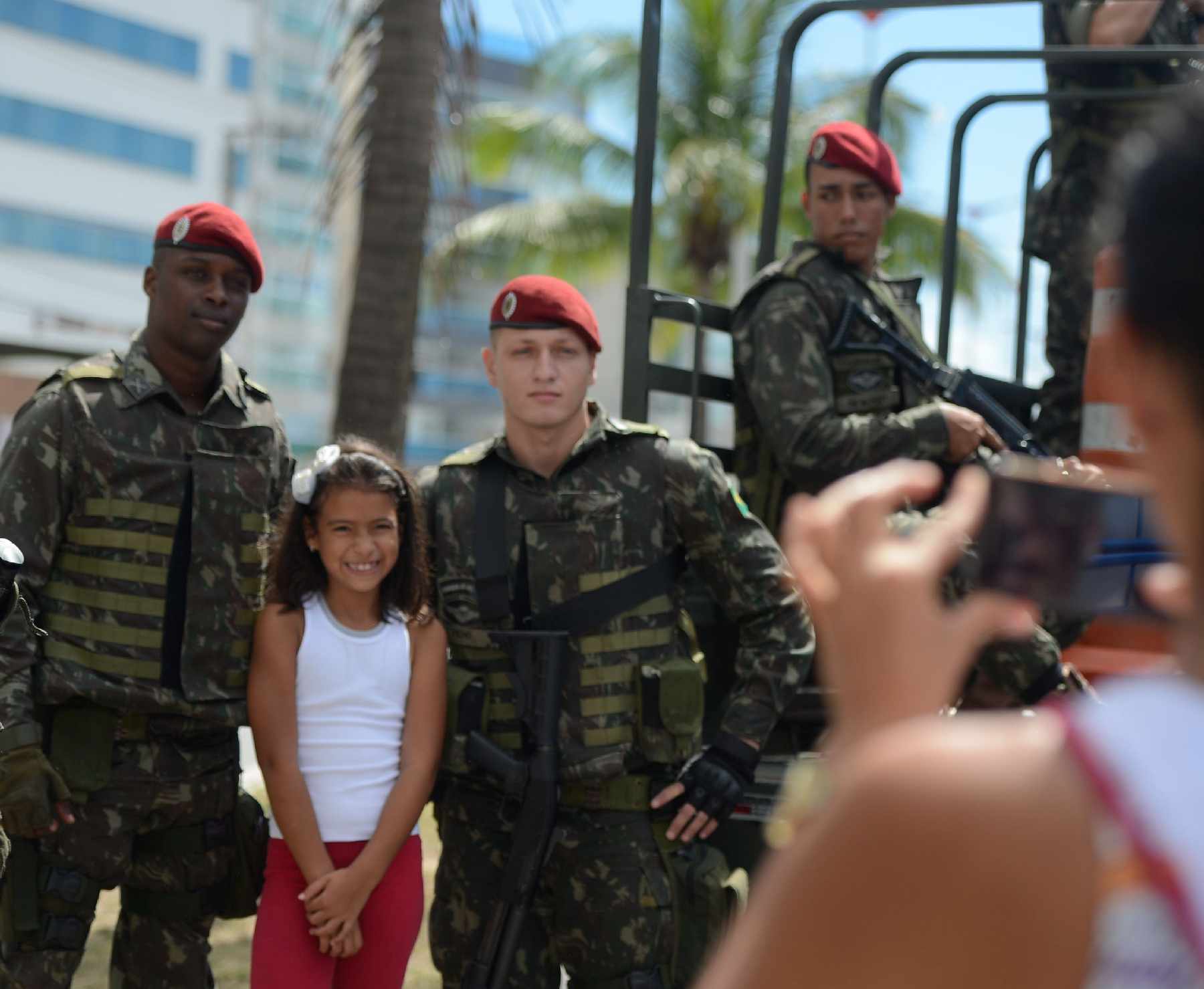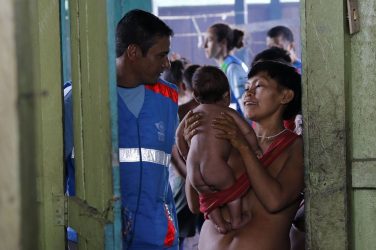Residents of Vitória, the capital of Espírito Santo state, staged a Peace Walk on Sunday (February 12) along Camburi beach. With posters, T-shirts, and white balloons, they called for a return to normalcy following a nine-day military police stoppage in the state.
As police gradually got back to work — there were 875 officers patrolling the streets of the state by Sunday — and with Armed Forces and National Public Security Force reinforcements, the residents reported they felt safer to get back to their regular activities and going out on the street.
According to Vitória mayor, Luciano Rezende, the demonstration aimed to bring families back to the city’s public spaces.
The mayor said local schools, health centers, and public services were going to resume most of their activities on Monday (February 13). “We should be getting gradually back to normal. The presence of more than 5,000 people here [at the march] shows that this is a sentiment we all share — we want to move on with our lives,” he added.
Beaches, bars and restaurants were bustling with people this weekend. Despite concerns, the locals have begun to go out of home more.
Carlos Henrique Ribeiro and Camila Lélis, a couple with their 2-year-old granddaughter Ana Júlia, joined the Peace March as an attempt to regain the feeling of peace they always used to have in Vitória. “I’m feeling pretty at ease, I’ve even brought my granddaughter with me,” said Ribeiro, a state prosecutor. He was off work last week because court and prosecution services faced shutdowns.
Eliete Bermudes, a 66-year-old retired civil police officer, said she still felt unsafe to leave home. “I think one of them has to give in. Neither the governor nor police will, and the population is caught in the crossfire. I thing both sides are wrong,” she said.
The wives and mothers of military police officers are still camping in front of the barracks locking vehicles and officers in as they demand better pay for their husbands and children.
The state Civil Police Union reported 142 people were killed in the state between February 4 (Saturday) and 10 am yesterday (12) . Violent killings reached a peak of 40 last Monday (6).
Back on the Streets
Brazilian police returned on Sunday to patrolling Espírito Santo state
Monday, February 13th 2017 – 10:45 UTCFull article1 comment
Defense Minister Raul Jungmann said normalcy was beginning to return in Espírito Santo, despite the fact that some families of military police officers continued to protest
By law, military police are not allowed to strike, so their relatives have taken the lead by demonstrating.
The result was an extraordinary wave of violence in Espírito Santo, including more than 130 homicides. Amid the insecurity, many state services were suspended.
More than 1,200 military police returned to patrols in Espírito Santo on Sunday as the n Brazilian state inched toward normalcy after a protest left a security vacuum that fueled a crime wave.
Schools in the state (north of Rio de Janeiro) are scheduled to reopen Monday and public transport will resume a full schedule, the president’s office said on Twitter.
While Defense Minister Raul Jungmann said normalcy was beginning to return in Espírito Santo, families and friends of military police officers continued to protest in front of barracks to demand higher pay for their loved ones, who belong to a force that plays a key role in Brazil’s security by patrolling the streets of its cities.
The result was an extraordinary wave of violence in Espírito Santo, including more than 130 homicides. Amid the insecurity, many state services were suspended.
Authorities called in more than 3,000 federal soldiers and sailors last week, and Jungmann has said those troops halted the crime spree and brought the homicide rate down.
Then, on Saturday, several hundred military police officers crossed the barricades to return to duty. On Sunday, even resumed patrols.
The state’s Department of Public Safety said in a statement that more than 1,200 military police officers reported for duty Sunday. They patrolled in two 8-hour shifts, on foot and with 59 vehicles. On a normal day, around 2,000 officers would be patrolling.
The Espírito Santo state government is experiencing an economic and fiscal crisis like many Brazilian states and has rejected demands for higher pay, though it has said it would analyze the system of promotions.
On Saturday, Most of the violence was centered in Vitória, the state capital and a wealthy port city ringed by golden beaches and filled with mining and petroleum companies.
More than 100 people have been reported killed during a six-day strike by police in the Brazilian state of Espírito Santo, as hundreds of troops patrolled streets attempting to keep order with schools and businesses closed and public transport frozen.
The Army mobilized airborne troops and armored vehicles on Thursday to reinforce roughly 1,200 soldiers and federal police trying to contain the chaos in Espírito Santo, a coastal state north of Rio de Janeiro.
Most of the violence was centered in Vitória, the state capital and a wealthy port city ringed by golden beaches and filled with mining and petroleum companies.
“We cannot establish definite motives for these killings at this time as the crisis is still ongoing,” said Gustavo Tenório, a spokesman for the police union. “But an initial evaluation by the homicide division seems to indicate that a majority of those who have died were tied to drug trafficking or some other type of crime.”
Police in Espírito Santo are demanding a pay raise amid an economic downturn that has hammered public finances in Brazil, with many states struggling to ensure even basic health, education and security services.
There are fears strikes could spread to other cash-strapped states that are not paying police and other public servants on time.
Luiz Pezão, governor of Rio de Janeiro state, one of Brazil’s most indebted, has already warned federal officials he may urgently need the backing of troops or federal police soon.
There are rumors of a pending police strike in Rio, a tourist hub that in three weeks will host one of the world’s biggest Carnaval celebrations, which draws partygoers from around the globe. Security officials have denied any such stoppage is planned.
In Espírito Santo, soldiers patrolled abandoned streets in downtown Vitória, stopping and frisking the occasional pedestrian against shuttered storefronts.
State officials said they needed hundreds more federal troops and members of an elite federal police force to help establish order and make up for the absence of some 1,800 state police who normally patrol Vitória’s metropolitan area.
“The Army’s involvement in Espírito Santo is temporary. It is here to make government negotiations possible and bring peace to the population. We are not going to replace the police,” General Eduardo Villas Boas said on Twitter.
Representatives of the striking police, including some of the officers’ wives, met with state officials on Wednesday to demand that salaries be doubled for every category of officer.
The union said its members have not received a raise in four years. Monthly pay for an officer starts at 2,643 reais (US$ 848), according to Corporal Thiago Bicolor, a spokesman for the striking police.
The Army mobilized airborne troops and armored vehicles to reinforce roughly 1,200 soldiers and federal police trying to contain the chaos in Espírito Santo.
ABr/MP






